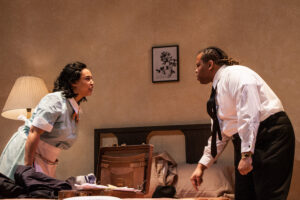Why You Should See “The Mountaintop” by Ron Malzer
“I just want to do God’s will. And he’s allowed me to go up to the mountain. And I’ve looked over. And I’ve seen the Promised Land. I may not get there with you. … Mine eyes have seen the glory of the coming of the Lord.”
–Dr. Martin Luther King, speaking at an April 3, 1968 rally in Memphis, less than 24 hours before he was murdered. –
Fifty-three years later, it’s still bone-chilling to recall these words spoken by Dr. King. Why did he decide, at age 39, and while standing on the apex of the civil rights/anti-war/anti-poverty movement, to prepare his followers to carry on after his death?
Acclaimed playwright Katori Hall takes on this question in “The Mountaintop”, an artistic imagining of King’s last night, firmly grounded in historical research. Hall’s script puts Dr. King in front of us with his human weaknesses in full display.
Weary, pained to be away from his wife and children, under attack from many quarters, and with the FBI bugging his rooms and waging psychological warfare against him, King seeks comfort from cigarettes. And when Camae, the maid on her first day on the job enters Room 306 of the Lorraine Motel, King’s longing for comfort in other forms is clear.
“My decision at the beginning was that I wasn’t going to pull any punches” says Emily Ware, who directed the play. “The public figures and the people we idolize were people at the core,” she added.
Maid Camae is sexy, and she knows it. What she lacks in formal education, she more than makes up for with her lived experience and cleverness. In cutting words, she puts Dr. King in his place; she is well-suited to take on the 20th century’s most powerful orator.
Gender and class tensions crackle between these two characters. And there is much humor, remarkably, in a play centering on a man facing his mortality. Challenged to give a description of her work, Camae snaps back “I clean up other people’s messes.”
Camae also gives voice to the challenge from Malcolm X that King’s approach of marching for nonviolence is doomed to failure. King, meanwhile, is feeling deep remorse that a recent march he called ended in the death of a youth at the hands of police.
We feel the currents churning in King’s mind on the eve of his killing. Claps of thunder are striking on that fateful night, triggering in him breath-choking panic attacks, much in the way that a combat veteran gets triggered by a sudden noise.
The play will draw you in to the torment and anguish this great man faced in his efforts to point us toward the Promised Land. You will also feel the deep ache in his heart as he sensed, correctly, that he would be killed well before we would reach Canaan.
The handling of Dr. King’s death is one unlike any treatment you have seen before, and the connections between 1968 and our current time are made clear by a director-written postscript unique to this production. Director Ware says she wants audiences to come away from this play feeling Dr. King’s “love for his work and his belief in what he was doing, and that contagious passion.”
The poet Nikita Gill has written “Heroes are never born fearless. They become heroes by facing their fears, by meeting them head on and saying, ‘You do not control me, or own me anymore’.” King is shown to be far from fearless as his life is under attack from many places, high and low. Yet he is unyielding in his fight for the dignity, worth, fair pay, and safe working conditions for the sanitation workers of Memphis, and his quest for an end to poverty and war in our world.
The Mountaintop brings home Dr. King’s suffering, while giving a window into his unique ability to transform human suffering into a divine vision, that of a world where peace and justice reign.
La Crosse Community Theatre’s “The Mountaintop” stars Shaundel Spivey as Preacher King, Darrell Ferguson as his understudy, and Katrina Sletten in the role of Camae. You can see it at the Weber Center this coming weekend, Thursday through Sunday. (An additional weekend may be added). For ticket information: https://lacrossetheatre.org/, or (608) 784-9292 (3-5 PM weekdays).

.

